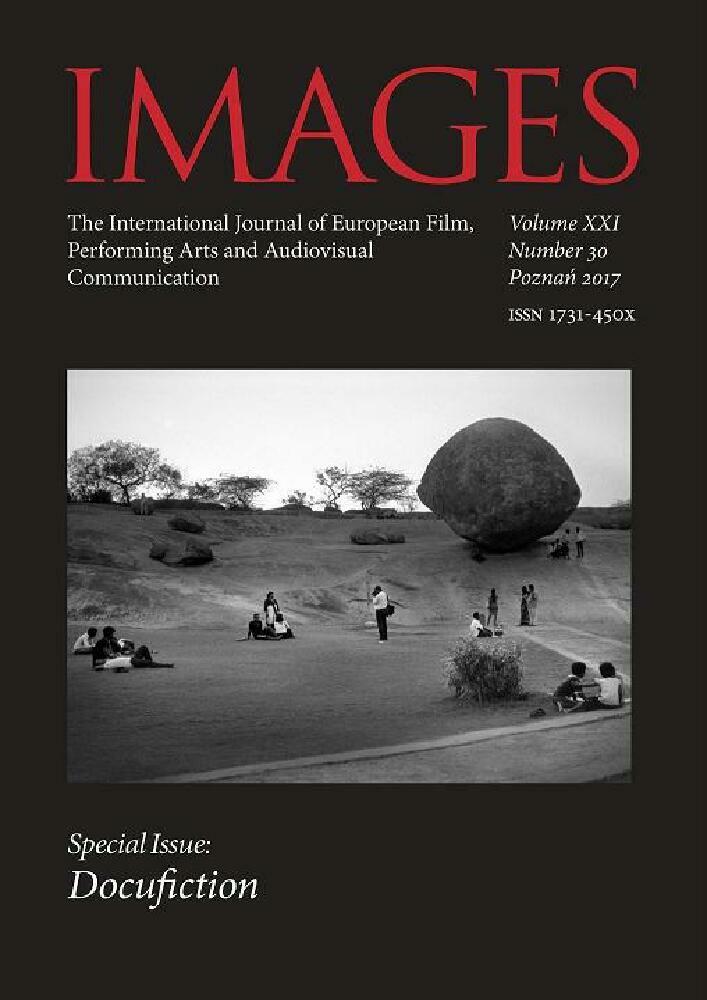Abstract
In my article, I examine the relationship between the documentary and performance. I focus special attention on Maciej Sobieszczański and Łukasz Ronduda’s film The Performer, which blurs the boundaries between film genres. Oskar Dawicki is a performer, and the protagonist of both a creative documentary and a feature film – this balancing on the borders of film genres and art is the focus of my reflections. The film’s authors took inspiration from the creative documentaries of Wojciech Wiszniewski and the plots of Grzegorz Królikiewicz, in which characters play themselves – in both cases, creative elements reveal the truth about each character. The most important aspect to me is the presence of the performer, which determines the form of the film and its reception. In my article I follow several themes which are key for understanding The Performer, among them the motif of disappearance and the relationship between the master and the disciple. I also deal with the problem of documenting performances – using the example of The Performer and the recording of Marina Abramović’s activities (Seven Easy Pieces by Marina Abramović, 2007). I also refer to the documentary film on Marina Abramović, The Artist Is Present, in which the performances recorded from 2010 go beyond the documentary formula.References
Akers M., The Artist Is Present, 2012, <https://www.youtube.com/watch?v=_KPNEAEZNHM> [dostęp: 31.03.2017]
Akers M., Director Matthew Akers on Marina Abramovic: The Artist is Present, 2012, <http://filmmakermagazine.com/46919-matthew-akers-marina-abramovic-the-artist-is-present/#.WN6vC_mGNPY> [dostęp: 31.03.2017]
Bal E., Świątkowska W. (red.), Performans, performatywność, performer. Próby definicji i analizy krytyczne, Kraków 2013
Bruzzi S., New Documentary, Oxford 2006
Dawicki O., Mowa jest srebrem, z Oskarem Dawickim rozmawia Adam Kruk, 2015, <http://www.dwutygodnik.com/artykul/5734-mowa-jest-srebrem.html> [dostęp: 25.03.2017]
Dorment R., Marina Abramović, review: “I hate it every second but I can’t deny it’s power”, 2014, <http://www.telegraph.co.uk/culture/art/art-reviews/10895104/Marina-Abramovic-review-I-hated-every-second-but-I-cant-deny-its-power.html> [dostęp: 3.04. 2017]
Gorczyca Ł., Kaczyński M. (red.), I’m sorry, Warszawa 2015
Gorczyca Ł., Ronduda Ł., W połowie puste. Życie i twórczość Oskara Dawickiego, Warszawa 2010
Guzek Ł., Przez performance do sztuki, 2005, <http://www.didaskalia.pl/69_guzek.htm> [dostęp: 4.05.2017]
Guzek Ł., Przez performance do sztuki, w: Klasycy i adepci polskiej sztuki performance, Katowice 2015, red. S. Brzoska, Poznań 2015
<http://filmpolski.pl/fp/index.php?film=1229977> [dostęp: 25.03.2017]
<http://marinaabramovicmademecry.tumblr.com/> [dostęp: 25.03.2017]
<https://www.flickr.com/photos/themuseumofmodernart/albums/72157623741486824> [dostęp: 3.04.2017]
<https://www.youtube.com/watch?v=OS0Tg0IjCp4> [dostęp: 3.04.2017]
Kazimierczak M., Performance, 2013, <https://malgorzatakazmierczak.wordpress.com/2013/04/10/performance/> [dostęp 4.5.2017]
Ronduda Ł., „Performer” po Berlinale” był porównywany do tego, co zrobiła Marina Abramović w MOMA”. Wywiad przeprowadził A. Zaborski, 2015, <http://kultura.gazeta.pl/kultura/1,114438,19000939,lukasz-ronduda-performer-po-berlinale-byl porownywany-do.html> [dostęp: 25.03.2017]
Ronduda Ł., Warpechowski, Konieczny, Uklański, Bodzianowski, Warpechowski, Dawicki, Warszawa-Łódź 2010
Warpechowski Z., Podręcznik, Warszawa 1990
Warpechowski Z., Przenikanie, w: Tu performance 5: performance art meeting: Oskar Dawicki, Wojciech Jaruszewski, Hanrich Lüber, Victorin Müller, Małgorzata Żarczyńska, katalog, Kraków 2000
Załuski T., Czy sztuka performance jest w ogóle możliwa?, w: Zwrot performatywny w estetyce, red. L. Bieszczad, Kraków 2013
License

This work is licensed under a Creative Commons Attribution-NonCommercial-NoDerivatives 4.0 International License.
